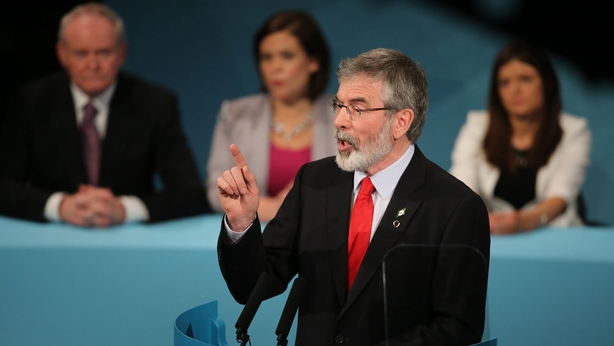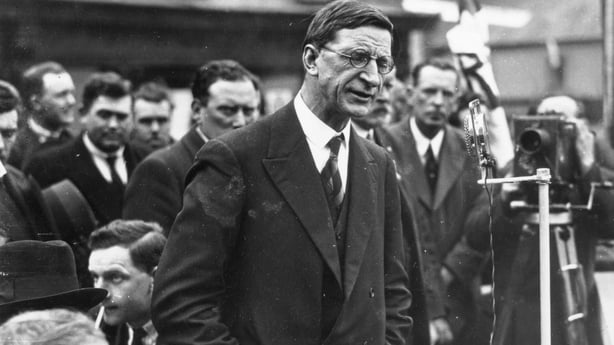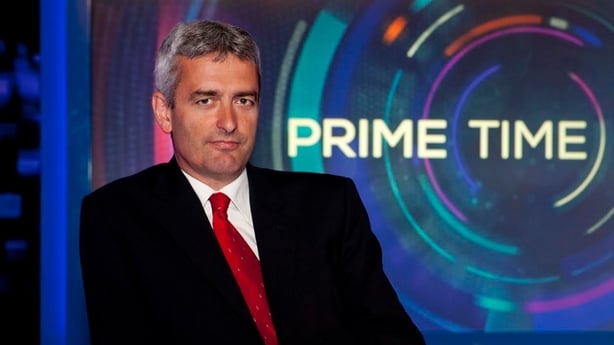By RTÉ's David McCullagh
Last summer, down in Connemara, I was discussing the forthcoming election with a wise old Fianna Fáiler.
"Enda will walk it," he observed. "Sure who else is there?"
And there, in a nutshell, is the biggest advantage for Fine Gael, and the biggest problem for Micheál Martin, the leader of my informant's party, and for other opposition groups.
If there is no credible alternative, the argument goes, Enda becomes inevitable.
A similar thing happened in 2002. The slow-motion implosion of Fine Gael, aided by Labour leader Ruairi Quinn's refusal to consider a pre-election coalition deal, made a Fianna Fáil victory – and Bertie Ahern's return as Taoiseach – inevitable.
The only question related to the coalition he would put together - if one were needed - as a Fianna Fáil overall majority seemed more likely than not at one stage.
It was the election where the people famously changed the Opposition, not the Government. Fine Gael was trounced; Sinn Féin and Independents made major gains; Labour stood still.
Fianna Fáil gained seats; but so too did the Progressive Democrats, who ran on the odd but effective platform that their coalition partners of the previous five years were not to be trusted on their own in government, and the PDs were the only likely, or credible, watchdogs.
It is a strategy the Labour Party will no doubt be thinking about.
But is Enda inevitable? The answer, as is usually the case in Irish politics, is yes – and no.
He seems to be inevitable if the main opposition parties stick to their current positions on coalition.
Fianna Fáil says it will not do business with Fine Gael or Sinn Féin.

Sinn Féin, meanwhile, says it will only go into government with parties which are signed up to the "Right to Change" principles, which Fianna Fáil is not, and in any event it won't join a coalition in which Fianna Fáil or Fine Gael are the largest party.
Given the fairly consistent opinion poll figures over recent years, showing both Fianna Fáil and Sinn Féin getting somewhere in the region of a fifth of the vote each, and with Fine Gael getting over a quarter, then the numbers simply don't seem to add up for a Fianna Fáil-led coalition excluding Fine Gael and Sinn Féin, or for an alternative coalition in which Sinn Féin would be the largest party.
Fine Gael won't find it easy to reach the magic figure either, but appears to be in the strongest position to do so. Which means Taoiseach Enda Kenny. Inevitable.
So, if it was the only way to avoid the inevitable, could Fianna Fáil and Sinn Féin, and some others, do business? Fianna Fáil gets very cross at the mere suggestion they would do any such thing, but then there are precedents for parties doing the unexpected.
For years, single-party government was a "core principle" for Fianna Fáil, until it wasn't; there was no way Labour would put Fianna Fáil back in office in 1992, until it did; Fine Gael could not go into government with Democratic Left, until it could.
There's an even more interesting precedent – the first Inter-Party Government of 1948-51. It was Ireland's first coalition government, but Fianna Fáil had managed to make "coalition" such a dirty word that that term wasn't used.
It brought together five parties – right-wing, pro-Commonwealth Fine Gael; left-wing, republican Clann na Poblachta; the small farmers party Clann na Talmhan; the Labour Party; and National Labour, which broke away after claiming the parent party was "infiltrated by communists" – a claim which must have raised some eyebrows in the Kremlin, in the unlikely event that Stalin was keeping an eye on events in Ireland.
An integral part of the coalition was a group of six Independents, led by James Dillon, who was made Minister for Agriculture (another precedent, no doubt of more than passing interest to Shane Ross).
How on earth could such a government work? Mainly through the unifying factor that they all detested Eamon de Valera, and for various reasons, some of them contradictory, wanted to get him out of the Taoiseach's office

They also realised – given Fianna Fáil’s refusal to consider coalition – that the only way to get into government was to band together.
It was the original ABFF coalition – Anybody But Fianna Fáil. Could the same trick be pulled off by Michéal Martin – ABFG&SF (Anybody But Fine Gael and Sinn Féin) – or by Gerry Adams – ABFG&FF (Anybody But Fine Gael and Fianna Fáil)?
It seems highly unlikely. Which leaves the choice facing the two main opposition parties between doing business with each other – or seeing the inevitable return of Enda Kenny.
By RTÉ's David McCullagh


